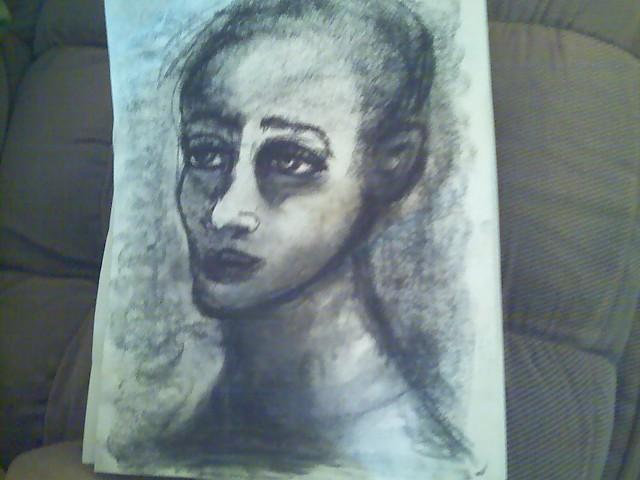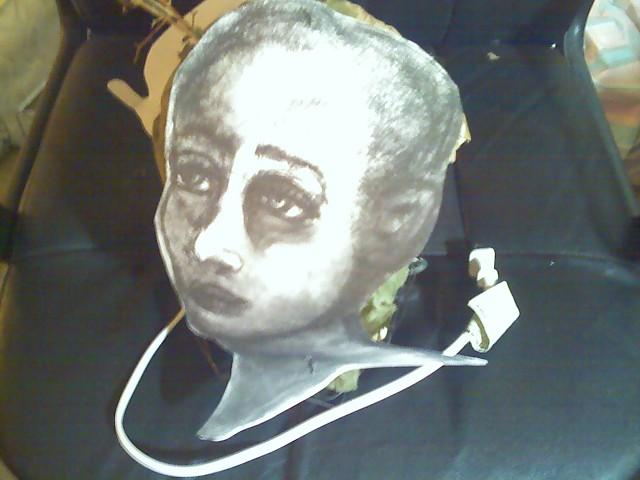
Manufacturing The Uncanny: An Exploration of Mental Illness & Extraordinary Thought Processes
As a student at The University of Texas at Austin, I am involved in a study of The Uncanny. My personal mission is to reveal aspects of The Uncanny as they relate to the experiences and thoughts of those diagnosed with a mental illness.
This page will document my projects for the class and hopefully offer some interesting ideas about how the mind manufactures uncanny thoughts, actions, and experiences.

Freud observed what he called the uncanny effect of epileptic fits, of manifestations of insanity. These effects, he observed, excited in the spectator the impression of automatic, mechanical processes at work behind the 'ordinary appearance of mental activity.'
I believe that The Uncanny applies to mental illness in at least these 3 ways:
1) From the spectator's point of view, as Freud addressed. Those who have witnessed someone in a state of mania report that the person seems to be "somewhere else" with a particular look in their eyes. Understandably, friends and family who witness a loved one during a manic episode worry about the person's safety and usually question the person's behavior and (lack of) rationale.
2) From the mentally ill individual's perspective; all the uncanny ideas, fears, beliefs, thoughts & compulsions. These vary, but can involve grandiose thoughts, delusions, detachment from reality, hallucinations, racing thoughts, heightened energy, euphoria, and feelings of invincibility. Often times, a manic individual believes supernatural messages are being communicated to them via various objects and media such as the radio or TV. As I develop this project, I plan to examine personal stories and experiences involving mania and the signs of mania.
3) From a scientific (and possibly Neurotheological) perspective which examines specific parts of the brain and universal processes. I will try to understand and relay various theories that deal with chemicals in the brain, imbalances, and various studies/theories which relate to my topic.
For my project, I choose to focus on this definition of Uncanny:
"mysterious, arousing superstitious fear or dread; having or seeming to have a supernatural or inexplicable basis; beyond the ordinary or normal; extraordinary"
My goal in creating Project One was to represent the notion that the human mind is naturally inclined towards the supernatural. I intend to explore possible connections between this theory and the facts that are known about mental illness, specifically manic depression and obsessive compulsive disorder. Supernatural thoughts often surface during manic episodes. I found many interesting articles online which relate to this topic...
An excerpt from http://www.nwbotanicals.org/oak/magick/createsgod.htm:
"Can we pinpoint what regions of the brain turn off and on during religious, visionary or extraordinary states of consciousness?
"Yes, scientists are using dynamic brain imaging techniques such as SPECT and functional MRI to directly vie the activation of brain circuitry. We can watch both blood flow and electrical activity in real time. The roles of the amygdala, hippocampus, temporal lobes, parietal lobe, and pineal gland are fundamental to our sense of well-being, meaningfulness, expansion from personal identity.
"Brain scans of a large sampling of people lost in prayer or deep in meditation reveal certain common neurological readings. These correlate with religious states ranging from transcendence, to visions, to enlightenment and feelings of awe. Attention or concentration in the frontal lobes is indicated by activation in this area of the brain during meditation."
From the same site, I found this question to be particularly thought-provoking:
"Could altering brain chemistry by playing with some visual and pleasure circuits, while quieting those governing self-image, cognition, orientation, and time sequencing give rise to a transcendental bliss, a god-experience?
"The god-experience is a process, a subjective perception, rather than an objectively provable reality. Distractions cease, replaced by the direct impact of oceanic expansion, sudden insight, childlike wonder, ecstatic exaltation above bodily and personal existence, dissolution in a timeless moment, fusion, gnosis."
The description above, along with the following, is characteristic of mania in manic depressive individuals...
It is direct perception coupled with high emotion and deep realization of what appears to be ultimate truth. It rips away the veil of illusion, revealing the pure ground state of our existence without any emotional, mental, or belief filters. Left with only pure awareness, the natural mind is finally free of earthly trappings. Bathed in emotions of joy, assurance and salvation, Cosmos becomes a living presence. Immortality is sensed, so fear of death vanishes.
"We have a natural human capacity for spiritual experience, just as we have one for comprehension of language or mathematics."
"Whether God exists as an overarching cosmic entity or not, there are certain mechanisms in the brain which humankind has harnessed over thousands of years to facilitate the process of non-ordinary experience. They all manipulate the body’s nervous system either by over- or under-stimulation of the sympathetic and parasympathetic systems of arousal. They lead us toward seeing, hearing, touching and feeling the Lord in an experiential, rather than conceptual way that culminates in fusion."
"Biologically, heavenly states are dependent on the limbic system or emotional part of the brain, and hormonal secretions. Mystical states are not fantasies, delusions or intangible events – they are the end result of complex chemical and neurological processes. They begin with instinctive awe and indefinable thrills, floating sensations, and perhaps spiritual hunger."
Mark Henderson, Science Editor of The Times reports the following, according to a British psychologist:
"The human brain is hard-wired to be susceptible to supernatural beliefs as a result of tens of thousands of years of evolution. Religion and other forms of magical thinking continue to thrive...because people are naturally biased to accept a role for the irrational in their daily lives."
This all begs the question: Are we programmed for God?
And furthermore, is mania just an extension or extreme materialization of this God program? Why are religious preoccupations and uncanny supernatural experiences so common among manic depressive individuals?
Based on the information I found, I chose to construct a representation of the brain. I decided to create a "head" that somehow conveyed the "god experience" associated with mania. I wanted to display this idea by contrasting mechanical objects with items found in nature.
I covered a small lamp with various materials, such as paper and

 wire.
wire.
I sketched a face and fastened it in front of the "head" using wire.


There are branches poking out of one portion of the brain to address the theory regarding the mind's natural tendency towards the supernatural.